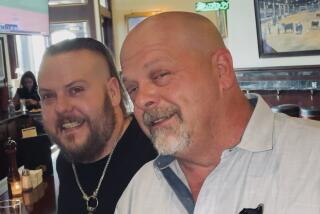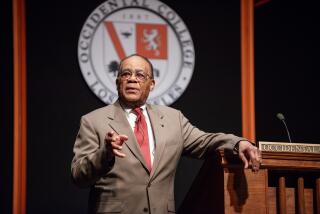PASSINGS: James E. Burke, Barbara Ann Scott, Stephen Frankfurt
James E. Burke
Johnson & Johnson CEO during Tylenol poisoning
James E. Burke, the former Johnson & Johnson chief executive whose leadership during the Tylenol poisoning scare of the 1980s became a model for corporate crisis management, died Friday in New Jersey after a long, unspecified illness, the company announced. He was 87.
Burke, who ran the New Brunswick, N.J., company for 13 of his 37 years there, also had a big impact in his second career, as chairman of the Partnership for a Drug-Free America for 16 years.
Burke was CEO at Johnson & Johnson in 1982 when seven people died from cyanide-spiked capsules of Tylenol, then the nation’s leading painkiller. His sure-handed response, from quickly recalling the product to reintroducing it with innovative, tamper-resistant packaging, inspired accolades and a Harvard Business School case study. In 2003, Fortune magazine named him one of history’s 10 greatest CEOs.
Born Feb. 28, 1925, in Rutland, Vt., Burke served in the U.S. Navy during World War II, commanding a landing craft tank in the Pacific. After the war he resumed his education, graduating from College of the Holy Cross in 1947 and Harvard Business School in 1949.
He started at Johnson & Johnson in 1953 as a product director and became president in 1973. He served as chief executive and chairman from 1976 through 1989.
Over that time, Johnson & Johnson’s annual sales more than tripled to $9 billion, net income increased nearly fivefold and the company expanded its operations from 37 to 54 countries, turning it into a global healthcare conglomerate.
After retiring, Burke was chairman of the Partnership for a Drug-Free America. In a rare honor for a CEO, Burke was awarded the prestigious Presidential Medal of Freedom in 2000 by President Clinton, for both his corporate and civic leadership.
Barbara Ann Scott
Canadian skater won Olympic gold
Barbara Ann Scott, 84, the only Canadian woman to win an Olympic gold medal in figure skating singles competition, died Sunday at her home on Amelia Island, Fla., according to Skate Canada. The cause was not disclosed.
In 1948, the year Scott won Olympic gold in St. Moritz, Switzerland, she also finished first at the European championships and the world championships, becoming the first North American skater to win all three titles in the same year. In 1947 she had also won the European and world titles.
Scott, who at 13 became the first female skater to perform a double lutz in competition, won the Lou Marsh Trophy as Canada’s top athlete in 1945, 1947 and 1948. She was inducted into Canada’s Sports Hall of Fame in 1955.
An Ottawa native, Scott skated with the Ice Capades and other professional touring companies for a few years after the Olympics. She married Tom King in 1955 and they lived for many years in Chicago before moving to Florida.
In 2009, she carried the Olympic torch into Canada’s House of Commons on its journey to Vancouver for the 2010 Winter Games. At the opening ceremony, she was one of eight Canadians to carry the national flag.
Stephen Frankfurt
Revolutionary adman
Stephen Frankfurt, 80, a Madison Avenue adman credited with bringing the creative revolution of the 1960s to television and movie screens, died Friday in New York, his family announced. No cause was given.
As creative director at New York-based Young & Rubicam, Frankfurt led some of the most distinctive advertising campaigns in U.S. business history. The campaigns established Eastern Airlines as “the wings of man,” introduced “the Excedrin headache” for Bristol-Meyers Co. and challenged consumers of Lay’s potato chips, “Bet you can’t eat just one.”
Frankfurt “adopted Y&R’s early motto, ‘Resist the usual,’ as his own,” the Art Directors Club wrote in 1983, inducting him into its Hall of Fame.
In January 1968, at 36, Frankfurt became president of Young & Rubicam but stepped down from the executive role in 1971. He turned his attention to marketing and publicizing movies, an early professional interest.
He had made a splash when given the chance to design the opening titles for “To Kill a Mockingbird” (1962). His opener, a tour of Jem and Scout’s mementos in a cigar box, was the first “in which a camera lovingly pans across details” that “grow in significance later in the film,” Peter Hall wrote years later in I.D., the International Design Magazine.
Frankfurt created the marketing campaigns for, among other films, “Rosemary’s Baby” (1968) — “Pray for Rosemary’s Baby” — and “Alien” (1979) — “In space, no one can hear you scream.”
In describing his approach to marketing movies, Frankfurt told the New York Times in 2005, “The most important thing is to think with your heart, not with your head … be heavily emotional versus practical.”
He went on to work as creative director at Bozell, Jacobs, Kenyon & Eckhardt; chairman of Frankfurt Balkind Partners; and vice chairman of Partners & Shevack.
Stephen Owen Frankfurt was born Dec. 17, 1931, in Manhattan. A graduate of New York’s Pratt Institute, he joined Young & Rubicam in the mid-1950s.
Times staff and wire reports
More to Read
Start your day right
Sign up for Essential California for the L.A. Times biggest news, features and recommendations in your inbox six days a week.
You may occasionally receive promotional content from the Los Angeles Times.





